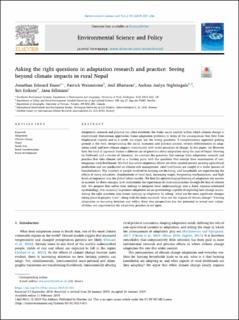| dc.contributor.author | Ensor, Jonathan Edward | |
| dc.contributor.author | Wennstroem, Patrick | |
| dc.contributor.author | Bhatterai, Anil | |
| dc.contributor.author | Nightingale, Andrea Joslyn | |
| dc.contributor.author | Eriksen, Siri | |
| dc.contributor.author | Sillmann, Jana | |
| dc.date.accessioned | 2021-06-17T11:09:51Z | |
| dc.date.available | 2021-06-17T11:09:51Z | |
| dc.date.created | 2019-03-21T10:34:11Z | |
| dc.date.issued | 2019 | |
| dc.identifier.citation | Environmental Science and Policy. 2019, 94 227-236. | en_US |
| dc.identifier.issn | 1462-9011 | |
| dc.identifier.uri | https://hdl.handle.net/11250/2759952 | |
| dc.description.abstract | Adaptation research and practice too often overlooks the wider social context within which climate change is experienced. Mainstream approaches frame adaptation problems in terms of the consequences that flow from biophysical impacts and as a result, we argue, ask the wrong questions. A complementary approach gaining ground in the field, foregrounding the social, economic and political context, reveals differentiation in adaptation need, and how climate impacts interconnect with wider processes of change. In this paper, we illustrate how this kind of approach frames a different set of questions about adaptation using the case of Nepal. Drawing on fieldwork and a review of literature, we contrast the questions that emerge from adaptation research and practice that take climate risk as a starting point with the questions that emerge from examination of contemporary rural livelihoods. We find that while adaptation efforts are often centred around securing agricultural production and are predicated on climate risk management, rural livelihoods are caught in a wider process of transformation. The numbers of people involved in farming are declining, and households are experiencing the effects of rising education, abandonment of rural land, increasing wages, burgeoning mechanisation, and high levels of migration into the global labour market. We find the epistemological framing of adaptation too narrow to account for these changes, as it understands the experiences of rural communities through the lens of climate risk. We propose that rather than seeking to integrate local understandings into a fixed, impacts-orientated epistemology, it is necessary to premise adaptation on an epistemology capable of exploring how change occurs. Asking the right questions thus means opening up adaptation by asking: ‘what are the most significant changes taking place in people's lives?’, along with the more standard: ‘what are the impacts of climate change?’ Viewing adaptation as occurring between and within these two perspectives has the potential to reveal new vulnerabilities and opportunities for adaptation practice to act upon. | en_US |
| dc.description.abstract | Asking the right questions in adaptation research and practice: Seeing beyond climate impacts in rural Nepal | en_US |
| dc.language.iso | eng | en_US |
| dc.publisher | Elsevier | en_US |
| dc.relation.uri | https://www.sciencedirect.com/science/article/pii/S1462901118311079?via%3Dihub | |
| dc.rights | Navngivelse 4.0 Internasjonal | * |
| dc.rights.uri | http://creativecommons.org/licenses/by/4.0/deed.no | * |
| dc.subject | Adaptation | en_US |
| dc.subject | Climate change | en_US |
| dc.subject | Nepal | en_US |
| dc.subject | South Asia | en_US |
| dc.subject | Rural transformation | en_US |
| dc.subject | Rural development | en_US |
| dc.title | Asking the right questions in adaptation research and practice: Seeing beyond climate impacts in rural Nepal | en_US |
| dc.type | Journal article | en_US |
| dc.type | Peer reviewed | en_US |
| dc.description.version | publishedVersion | en_US |
| dc.source.pagenumber | 227-236 | en_US |
| dc.source.volume | 94 | en_US |
| dc.source.journal | Environmental Science and Policy | en_US |
| dc.identifier.doi | 10.1016/j.envsci.2019.01.013 | |
| dc.identifier.cristin | 1686618 | |
| dc.relation.project | Norges forskningsråd: 244551 | en_US |
| cristin.unitcode | 7475,0,0,0 | |
| cristin.unitname | CICERO Senter for klimaforskning | |
| cristin.ispublished | true | |
| cristin.fulltext | original | |
| cristin.qualitycode | 1 | |

